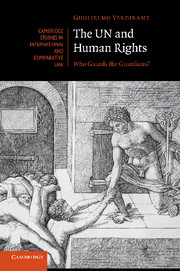Book contents
- Frontmatter
- Contents
- Foreword
- Acknowledgements
- Abbreviations
- Table of cases (international)
- Table of cases (national)
- Table of legal instruments
- Introduction
- 1 Concepts and definitions
- 2 Human rights obligations of international organisations
- 3 International institutional responsibility
- 4 UN relief and development operations
- 5 UN peacekeeping operations
- 6 International administrations
- 7 Implementation of UN sanctions
- 8 Accountability
- Conclusions
- Bibliography
- Index
- References
1 - Concepts and definitions
Published online by Cambridge University Press: 07 October 2011
- Frontmatter
- Contents
- Foreword
- Acknowledgements
- Abbreviations
- Table of cases (international)
- Table of cases (national)
- Table of legal instruments
- Introduction
- 1 Concepts and definitions
- 2 Human rights obligations of international organisations
- 3 International institutional responsibility
- 4 UN relief and development operations
- 5 UN peacekeeping operations
- 6 International administrations
- 7 Implementation of UN sanctions
- 8 Accountability
- Conclusions
- Bibliography
- Index
- References
Summary
Introduction
A number of concepts and ideas central to the argument of this book require some exploration at the outset. First, there is no agreed legal definition of international organisation, although working definitions have been adopted in specific instruments. There is also a tendency in the legal literature to disregard the operational dimension of international organisations, and of the UN in particular, probably because the expansion in operational activities has not followed a predetermined plan. In a book such as this, both of these aspects of international organisations – their definition and the history of their operational expansion – require attention.
Secondly, the autonomy of international organisations is often treated as a useful fiction, that is a statement of fact that bears little or no relation to reality but serves a function. The utility of the fiction of autonomy is, in particular, that it buttresses the legal personality of international organisations. The view that autonomy is a fiction colours perceptions of international organisations, but is it still correct? Do we really need to suspend disbelief in order to regard international organisations as autonomous? Rather, could their autonomy not be, at least in respect of some of their activities, a social fact?
- Type
- Chapter
- Information
- The UN and Human RightsWho Guards the Guardians?, pp. 12 - 54Publisher: Cambridge University PressPrint publication year: 2011



